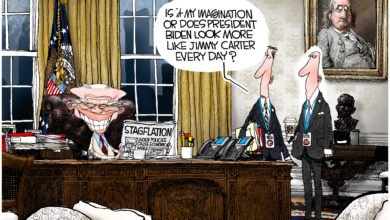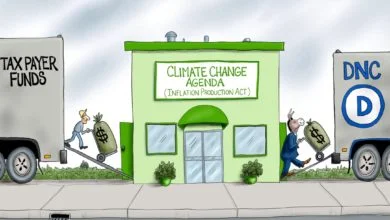Why Paul Krugman Can’t Admit Inflation Is Making Americans Poorer
New government data have some unwelcome news: The public is getting poorer.
Census Bureau data released last week show that median household income fell to $74,580 last year, down nearly $1,800 from the previous year, $76,330.
The 2.3% drop was the sharpest annual decline since 2010, financial observers noted , and marks the third consecutive year that household incomes have fallen.
With median household income down nearly 5% since 2019, many families are struggling. Yet economist Paul Krugman insists the economy is thriving.
“The economic data have been surreally good,” the New York Times columnist recently said in an interview with Christiane Amanpour. “Even optimists are just stunned by how quickly and painlessly inflation has come down.”
“The economic data have been just surreally good. Even optimists are just stunned,” says Nobel Prize-winning economist @paulkrugman. So why do polls show most Americans don’t think the economy is doing well? “There’s a really profound and peculiar disconnect going on.” pic.twitter.com/MNFhzZ2hh3
— Christiane Amanpour (@amanpour) September 12, 2023
This is why Krugman said he can’t understand why polls show an overwhelming majority , or 71%, describe the economy as “not so good or poor.”
“There’s a really profound and peculiar disconnect going on,” Krugman said.
Interestingly, this “disconnect” is one Republicans and Democrats share. A new Harris poll commissioned by the Guardian shows a statistically equal percentage of Democrats, or 68%, and Republicans, at 69%, say “it’s difficult to be happy about positive economic news when they feel financially squeezed each month.”
Why so many feel squeezed is not a mystery. Household incomes are shrinking because of inflation . Wages may be increasing in nominal dollars, but they are not keeping up with rising prices. According to the Department of Agriculture, food prices increased by 9.9% in 2022, and that’s on top of the 3.5% bumps of the previous two years. Meanwhile, rent prices have increased at the fastest rate since Lou Gehrig was winning home run titles with the Yankees.
The surge in prices explains the decline in household incomes. Government data show that real wages (wages adjusted for inflation) continue to fall and are down 4% since President Joe Biden took office.
All of this, however, is embarrassing for Krugman to admit.
The Nobel Prize-winning economist was at the forefront of the group calling for a robust federal spending bill in early 2021. Splitting with more prudent left-wing economists (actually, better ones) such as Lawrence Summers, Krugman urged Biden to “go big and ignore the worriers,” calling the inflation threat “ greatly exaggerated.”
Alas, the “worriers” were proven right.
Eight months after Krugman poo-pooed the risk, inflation hit 30-year highs. By this time, it was clear that “ Team Transitory” had gotten things wrong, so Krugman pivoted to arguing that high inflation isn’t actually all that bad for poor people.
Krugman eventually issued a public mea culpa in the New York Times: ”I was wrong about inflation.” Unfortunately, he has since relapsed into denial, arguing that inflation isn’t that bad if one excludes “food, energy, shelter, and used cars” and that Team Transitory was right all along.
Krugman is right that there’s a profound disconnect at work, but the disconnect involves himself.
Economic data show that American households have seen their wealth decline three years in a row because of inflation, and many are clearly feeling the economic pinch because of it. The idea that they are experiencing some kind of “disconnect” because they don’t read monthly consumer price index data shows how out of touch Krugman is.
Krugman is not alone in his inflation denialism, of course. He has plenty of company there.
Some deny inflation’s harms, while others deny its causes, such as Sen. Elizabeth Warren (D-MA), who continues to push the fiction that inflation is caused by “corporate greed,” a claim recently debunked in a Federal Reserve report.
The truth is Ernest Hemingway had it right when he called inflation “the first panacea for a mismanaged nation” (the second is war). The word “mismanaged” is key.
The economist Ludwig von Mises long ago pointed out that there’s nothing mysterious about inflation. Basic economics shows price inflation is caused by an expansion of the money supply, specifically when the money supply grows at a faster rate than the production of goods and services.
“The most important thing to remember is that inflation is not an act of God, that inflation is not a catastrophe of the elements or a disease that comes like the plague,” said the Austrian economist. “Inflation is a policy.”
The people experiencing a disconnect are those who believed central bankers could pump $7 trillion into the economy over 30 months and not cause serious inflation. Unfortunately, it’s families who are paying the price for their delusion.
“The first panacea for a mismanaged nation is inflation of the currency; the second is war. Both bring a temporary prosperity; both bring a permanent ruin. But both are the refuge of political and economic opportunists.”
– Ernest Hemingway (1899-1961) pic.twitter.com/3SnmflJpbY— Jon Miltimore (@miltimore79) August 14, 2023
This article originally appeared on The Washington Examiner.
Content syndicated from Fee.org (FEE) under Creative Commons license.
Agree/Disagree with the author(s)? Let them know in the comments below and be heard by 10’s of thousands of CDN readers each day!




